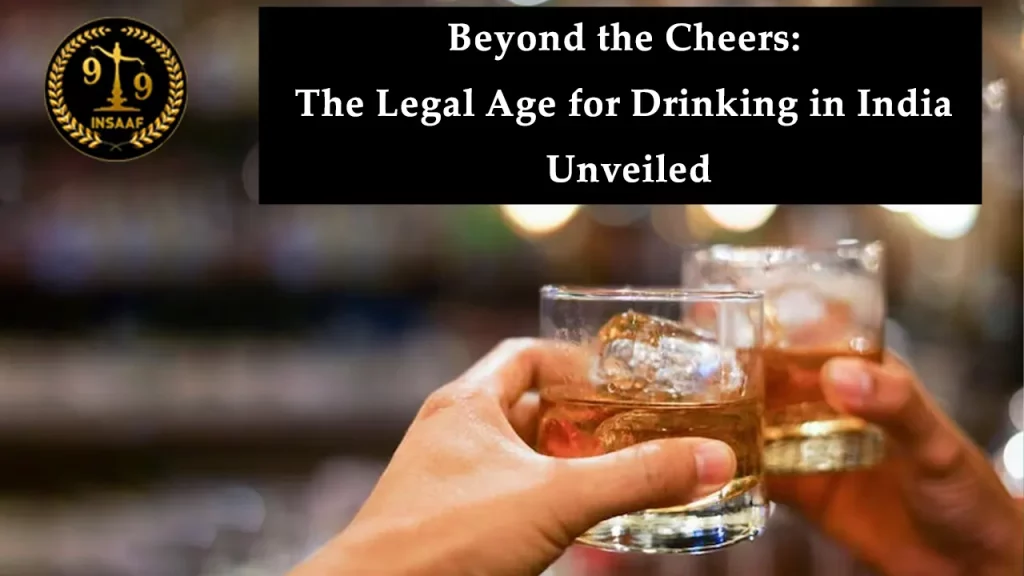

Online Legal Advice from Insaaf99® Online Lawyer Consultation in India


Online Legal Advice from Insaaf99® Online Lawyer Consultation in India

In India, the regulation of alcohol consumption is a multifaceted and intricate matter, deeply rooted in the diverse cultures. With a rich history of traditions and values, the country grapples with finding a balance between individual freedoms and societal well-being. At the heart of this discussion are the legal drinking age in India and the age for consuming alcohol, reflecting the socio-cultural dynamics and changing perspectives of its citizens.
India, known for its vibrant colors and diverse customs, paints an equally varied picture regarding alcohol and its legal landscape. Unlike nations with a uniform drinking age, India's regulations are woven by individual states, creating a fascinating, though sometimes confusing, patchwork of laws and minimum drinking ages.
The Republic of India has 28 states and 8 Union Territories, the regulations around alcohol consumption are diverse. The legal drinking age, also known as the legal age for drinking, plays a crucial role in shaping these rules.
At the heart of this legal complexity lies the question of who can raise a glass. While the majority of Indian states, like Uttar Pradesh, Madhya Pradesh, and West Bengal, set the legal age for drinking at 21, others like Goa, Sikkim, and Puducherry welcome patrons as young as 18. This patchwork can be jarring for travelers, who might find themselves legal on one side of a state border and prohibited on the other.
The Majority at 21: In most Indian states, like Uttar Pradesh, Madhya Pradesh, and West Bengal, the legal drinking age is 21 years old. This aligns with the global average and reflects a focus on protecting young adults from potential alcohol-related health and social harms.
The Exceptions at 18: However, several states, including Goa, Sikkim, and Puducherry, have set the legal drinking age at 18. This lower threshold attracts tourists and businesses seeking a more relaxed atmosphere. For travelers moving between states, it's crucial to remember that a valid age proof in one state might not grant you access in another.
Beyond Age: It's crucial to recognize that age is just one facet of India's alcohol regulations. Each state crafts its own rules governing the sale, consumption, and public conduct related to alcohol. Notably, states such as Nagaland and Mizoram, influenced by strong cultural stances, enforce complete alcohol bans. On the other hand, Gujarat, guided by historical and ethical factors, remains a dry state.
Balancing Act: The diverse legal drinking ages in India underscore a nuanced equilibrium between state autonomy, revenue considerations, promoting responsible consumption, and addressing public health issues. States like Maharashtra and Tamil Nadu heavily rely on alcohol taxes while concurrently implementing stringent measures to curb excessive drinking and public intoxication.
Also Read :- Demystifying the digital minefield: is cryptocurrency legal in India and is there any tax on cryptocurrency in India
The imposition of a legal drinking age is based on a blend of considerations, encompassing health considerations, societal consequences, and the risk of misuse. Supporters contend that establishing a minimum age safeguards the physical and mental health of young individuals whose bodies and minds are still maturing.
Additionally, advocates for age restrictions underscore the social ramifications of alcohol consumption, particularly in a culturally diverse country like India. The diverse perspectives on alcohol within different regions and communities add layers of complexity to formulating consistent regulations.

Fines: The most prevalent repercussion for underage drinking is a monetary fine, the amount of which may vary based on the gravity of the violation and your age.
Community Service: As part of the penalty, you might be mandated to engage in community service.
Alcohol Awareness Classes: Attendance in alcohol awareness classes could be a stipulated requirement to educate about the hazards of underage drinking.
Driver's License Suspension: If apprehended for driving under the influence of alcohol as a minor, your driver's license could face suspension.
Jail Time: Underage drinking, particularly for repeat offenders or those involved in severe incidents, may result in imprisonment in certain instances.
Enforcing alcohol laws in a country as vast and diverse as India poses significant challenges. The coexistence of varying legal drinking ages across states can lead to confusion, especially for individuals who frequently travel between regions. The lack of a uniform national standard raises questions about the efficacy of such laws and the need for a more cohesive approach.
Additionally, issues of underage drinking persist, highlighting the importance of robust enforcement mechanisms. Strengthening awareness campaigns, promoting responsible drinking, and investing in law enforcement resources are crucial steps in addressing these challenges.
Navigating the spirited waters of alcohol laws in India, particularly concerning the legal drinking age and the legal age for drinking, is a journey through a landscape of diverse traditions, values, and perspectives. As the country continues to evolve, finding a balance between individual freedoms and societal well-being remains an ongoing challenge for lawmakers. The complexities and variations across states underscore the need for a thoughtful and comprehensive approach to alcohol regulation, one that considers the diverse cultural fabric that defines India.
Also Read :- Surrogacy in India: navigating the intricate surrogacy law and finding answers “is surrogacy legal in India?"
Insaaf99, an online legal consultation platform, excels in aiding individuals facing legal complexities in alcohol-related cases. Connecting users with specialized attorneys, the platform ensures personalized advice on issues such as legal drinking age and licensing. With a user-friendly interface and transparent attorney profiles, Insaaf99 streamlines the legal consultation process. Its commitment to regional expertise makes it an invaluable resource for users dealing with diverse legal drinking regulations across states. Insaaf99 stands as a beacon of accessible and efficient legal support, empowering individuals to address alcohol-related legal concerns promptly and effectively.